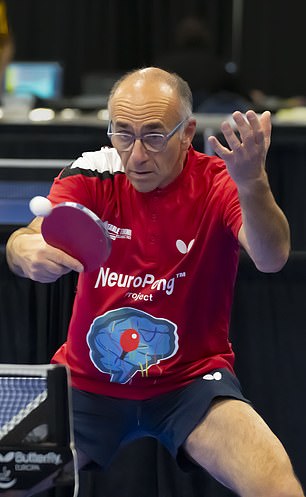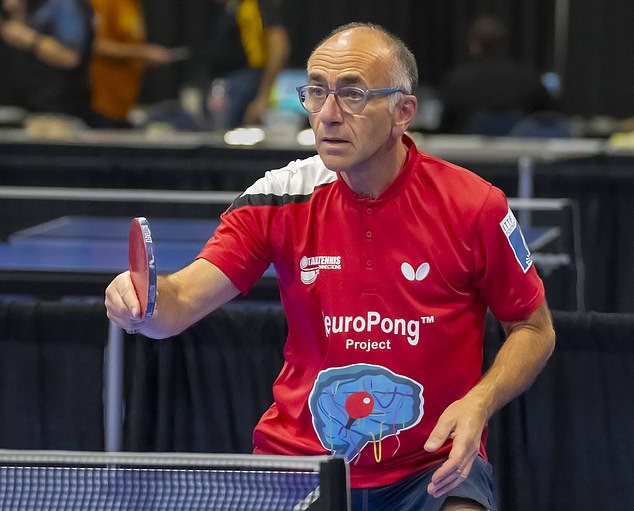It may seem like a fun game to play with your children.
But doctors could soon prescribe table tennis as a treatment for multiple sclerosis (MS) after a series of “ping pong clinics” reported marked improvement in symptoms among their patients.
A trial to validate the table tennis treatment, led by Dr. Antonio Barbera of the University of Colorado, begins this week in the United States and Italy.
Dr. Barbera, clinical assistant professor of obstetrics and gynecology, was diagnosed with MS in 2016.
Playing ping pong has helped him regain the movement and feeling he lost in his right leg and left arm and to walk again, he says.
A trial of table tennis as a method to help MS begins this week led by Dr. Antonio Barbera of the University of Colorado (pictured).
He has held regular ping pong sessions near Denver for three years with “amazing results”; Others who have attended report improvements in mobility, balance, flexibility, and core muscle strength.
This sport forces people to coordinate different parts of the body, brain and vision and is highly aerobic.
Dr. Barbera’s Neuropong program has expanded from its first location in Fort Collins, Colorado, to several other cities across the United States.
If the trials are successful, he plans to take his clinic to Italy and eventually to the UK as well.
“Table tennis has worked wonders for me and many others who have participated in the sessions,” he said.
‘I believe it has the potential to revolutionize MS therapy worldwide and I hope this trial kick-starts that process by scientifically validating the benefits that I and many others have seen.
‘Being such a fast game, ping pong really challenges our brain much more than any other activity. Brings together aerobic activity, balance and eye coordination – works your core and legs and makes people smile.
“Not only must their eyes, hands and feet be synchronized, but they must also process information in less than half a second for the paddle to react to the ball.”


Dr. Barbera (pictured) has been running regular ping pong sessions near Denver for three years with “amazing results”; Others who have attended report improvements in mobility, balance, flexibility, and core muscle strength. If the trials are successful, Dr. Barbera plans to take his clinic to Italy and eventually to the United Kingdom as well.
The MS Society estimates there are more than 130,000 people with the condition in the UK, with almost 7,000 new diagnoses a year, and up to three quarters experiencing problems with their arms or hands.
“We know that exercise can help control some symptoms of MS, including fatigue and problems with balance and walking,” said Caitlin Astbury of the MS Society, adding that “there is a real possibility that exercise table tennis can help people with MS.
There is no cure for this condition, but medications can help control and relieve some of the symptoms. And proponents of table tennis therapy believe it can play an important role in complementing available medication.
The 16-week trial involves 40 people with MS living in areas around Denver and Pavia, Italy.
It will investigate how table tennis can improve participants’ motor and non-motor symptoms, including fatigue, muscle weakness, reductions in movement and impaired cognition, pain and depression.
The test consists of two two-hour table tennis sessions per week, with baseline and endline assessments of quality of life and eight measures including strength, walking speed and balance.
This is believed to be the first trial to look at the benefits of table tennis for people with MS, although there have been several studies suggesting it could help people with other neurodegenerative diseases such as Parkinson’s.
The University of Colorado is a sponsor of this year’s American Association for the Advancement of Science (AAAS) conference in Denver.


